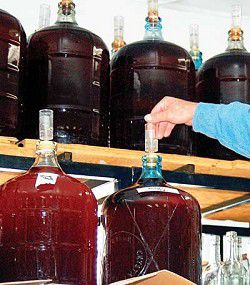History in a bottle
Published 5:00 pm Tuesday, June 24, 2008

- <I>The Eagle/Scotta Callister</I><BR>The wine is kept in large glass jars before bottling for sale, to allow the sediments to settle.
MT. VERNON – You might say that David Hamilton’s latest wine creation has roots going back more than a century into Grant County history.
That’s because the fruit used to make the wine comes from the remnant trees of a plum orchard planted by Charles M. Belshaw, an enterprising Englishman who came by wagon train to the John Day Valley nearly 150 years ago. A road near Dayville still bears his name.
“He was a horticulturist, and he propagated several new varieties of fruit – including the Belshaw plum,” Hamilton said.
The fruits of that labor are celebrated in the David Hamilton Winery’s Belshaw Plum Wine. The label bears Belshaw’s image and a bit of history about the man.
Hamilton, who opened his winery in 2003, specializes in “green” wines – those made with fruit that is picked from the wild or grown by organic growers.
A couple of years ago, his curiosity was piqued when a local customer dropped into the tasting room and happened to mention that she had a couple of wild plum trees in her yard. She had been told that they were Belshaw plums, and she invited him to pick the fruit.
Hamilton did some research at the Grant County Historical Museum and checked out the trees, determining that they likely were among the last of the Belshaw orchards. No Belshaw plum trees still grow on the original homestead, he said.
The timing was good, as Hamilton was able to pick plums from the trees that year. The aging trees only produce fruit every five or six years.
He made about 100 gallons of the wine, and let it age over the next year.
The result was Hamilton’s first historic-themed wine, but he’s made others with regional ties. They feature Snoqualmie Valley blackberries, Mt. Adams huckleberries, Hells Canyon wild plums, Gravenstein apples from the Hood River Valley and even Oregon grape.
Like his other wines, the Belshaw wine is made with fruit and certified organic sugar.
“I like to shop locally,” he said, but the sugar is one exception to that rule. He found a company that imports organically-produced cane sugar – a hard-to-find commodity – from Paraguay.
The other thing he touts about his wines is that they have no sulfites, a preservative commonly used in the grape wines that dominate the wine market.
“No sulfites – no headache,” he said.
But it’s the taste that he touts the most.
He said there are other fruit wine producers who use a grape base, and then flavor it with fruit. But Hamilton eschews the grape.
“I like my wine to taste like fruit,” he said. “My raspberry wine tastes like you just threw a handful of ripe raspberries into your mouth.”
He said the “dry grape-wine people” may look down their noses at fruit wines, dismissing them as “dessert wines,” but his customers like the taste.
The winery is not a big operation – it occupies just two rooms, one filled with jars and vats of wine-in-progress, and the other really a storage area remodeled into a tasting room. However, the space is big enough for Hamilton to produce and showcase his 400 to 1,500 gallons of wine a year.
The setting, just off the main highway and right next to the laundromat, lacks the pretention of big-name wineries, but it has individual charm. The walls bear photos and keepsakes from his travels, a hand-sewn Lakota antelope-hide shirt made by his wife, Crish, and a photo of his grandfather, who started Hamilton on the path to winemaking.
Hamilton first learned the craft from his grandfather, an independent thinker who shocked his conservative neighbors in Waco, Texas, by drinking homemade fruit wine “in public” – on his back porch. Hamilton’s grandfather also taught him about beekeeping and left him his bee colonies.
At one time, Hamilton still keeps about 200 colonies of bees in Northeast Washington. The beekeeping complements Hamilton’s interests: making honey and producing mead, or honey wine.
Mead, he said, is the oldest alcoholic drink known to man. It dates back to the ancient Celtic cultures when it was thought to enhance virility and have aphrodisiac qualities.
“They called it the ‘honey moon’ wine,” he said, reflecting on an Irish tradition that sought to boost the population by having the bride and groom drink honey wine each day for a month after their wedding.
Hamilton’s meads – the flavors include ginger, blackberry, huckleberry and true mead – must be aged longer than the fruit wines, three years.
For the true mead, he buys special honey from a beekeeper in Washington whose bees pollinate starthistle.
“Starthistle is a horrible weed, but it produces honey that is just beautiful,” Hamilton said. “It also makes true mead.”
Hamilton’s honey and fruit wines – including the new Belshaw Plum Wine – are available at the winery in Mt. Vernon and at Chester’s Thriftway in John Day. The winery is open for tasting and sales Friday, Saturday and Sunday from noon to 5 p.m., or “whenever my truck is there and my door is open,” he said.






